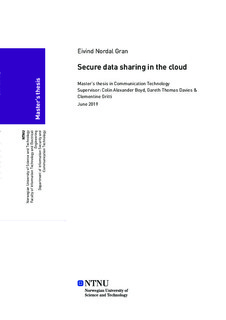| dc.description.abstract | Sikkerhet innen skydeling er et viktig tema i verden i dag. Sikker-
hetssystemet i de vanligste løsningene for skydeling krever at brukeren
stoler på leverandøren av skytjenesten for å beskytte den opplastede
dataen. En ny nøkkel-delingsprotokol kalt OAGK, for skybruk er utviklet
på NTNU for å omgå dette tillitsproblemet. OAGK-protokollen har som
mål å ha sterke sikkerhetsfunksjoner samtidig som den skal fungerer i
kombinasjon med skytjenester. Denne masteroppgaven tar for seg å teste
OAGK protokollen i praksis, for å evaluere hvor effektiv og praktisk den
er, og hvor godt den fungerer sammenlignet med andre kjente protokoller
brukt i skyen. For å gjøre dette, har to andre protokoller blitt utvalgt
for å danne et sammenligningsgrunnlag, TGDH protokollen som brukes
i en eksisterende sikker skyløsning, og en elementær protokol basert på
konseptet PKE. Disse to protokollene, i tillegg til OAGK, er derfor blitt
realisert og implementert i et Java-miljø med hensikt å bestemme hvor
effektiv og praktisk protokollen er. Disse forsøkene ble konstruert for
å gi pålitelige og gode resultater for en sammenligning av protokollene.
Tidsbruk, lagringsbehov og flere attributter ble brukt for å bestemme hvor
funksjonelle og praktiske de tre protokollene er i forhold til hverandre. I
TGDHder det ble gjenbrukt gammel kode funnet på Github, OAGK og
PKE ble implementert fra grunnen av. Selv om testene bare ble kjørt
lokalt, og dermed ikke representerer et ekte skymiljø, indikerer resultatene
at OAGK er tregere og mindre praktisk enn PKE og TGDH. Imidlertid
så opererer OAGK på en tilstrekkelig god måte og er i visse tilfeller den
foretrukne protokollen av de tre. Dette kan bety at det er en fremtid for
OAGK protokollen. | |
| dc.description.abstract | Cloud sharing security is an important topic in today’s society. The
majority of the most common cloud sharing solutions require that the user
trust the Cloud Service Provider (CSP) to protect and conceal uploaded
data. A new key sharing protocol called the Offline Assisted Group Key
exchange (OAGK) for cloud use has been developed at the Norwegian
University of Science and Technology (NTNU) to create an alternative
to trusting the CSP. The OAGK protocol aims to have strong security
capabilities while at the same time function well in a cloud environment.
This thesis sets out to test the OAGK protocol in practice, to evaluate the
efficiency, practicality and how well it compares to other known solutions.
In order to do this, two other protocols been chosen for comparison, the
Tree-based Group Key Agreement (TGDH) protocol which is used in
an existing secure cloud solution and the basic protocol concept called
Public Key Encryption (PKE). These two protocols in addition to the
OAGK are realized and implemented in a Java environment. Tests have
been conducted to determine the the efficiency and practicality of the
protocol. Experiments were constructed to provide well defined sample
data for a comparison of the protocols. Computational effort, storage
required and several other features used to determine the practicality was
used in order to juxtapose the three protocols. Both the OAGK and a
version of PKE were implemented from scratch and the TGDH was done
using existing code found on Github. Even though the tests were only
run locally they do indicate that the OAGK is slower and less practical
than the PKE and TGDH. However, the OAGK performs adequately and
is in certain cases the preferred protocol of the three. The tests indicate
that there could be a future for the OAGK protocol. | |
